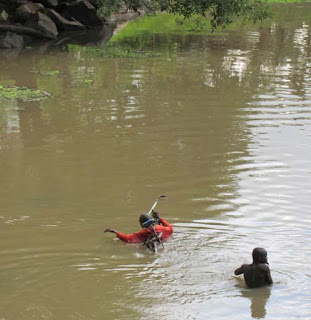
Wow! The south of South Sudan is very lush this time of year. We were impressed by all the fresh produce available in the market and we filled up on pineapple, bananas, cucumbers, and onions – what a treat! Much of the produce is grown right there and in the Democratic Republic of Congo which is a close neighbor to the south.
We visited Yambio, the capital of the Western Equatoria State. This town has electricity 24 hours a day – when the town has enough diesel fuel to run the generators. There are many Zande people living in Yambio. Besides South Sudan, the Zande also live in the D.R. Congo and Central African Republic.
We were privileged to meet Pastor Sanango. He is living in Yambio ministering to the Zande refugees from the DRCongo. He is fluent in four languages; French, Zande, Lingala, and Swahili and he apologized to us saying, “I am working on English.” Well – I don’t think any apology is needed – do you?
I watched his little daughter/grand-daughter (we didn’t quite understand the relationship) for quite some time. Her responsibility was to keep the chickens away from the food which was cooling. Her mother has a small business baking and selling cakes – I believe it was a sweet cornbread type cake. She poured batter into a small, well-oiled pan and place it on the fire; then she put hot coals on top of the lid, a flat metal disk which fit on top of the pan. After the cake was baked she popped it out of the pan, placing it on a plate to cool. Of course all this was done near the ground, close to the fire, there was no table to use; so this little girl had a big job – to shoosh away the chickens and not let them take a beak-full of mom’s cakes. She was very good at it too!
Here is the tukel (too-kul) we stayed in during our visit to Yambio. It’s one square room, quite adequate for our needs, especially after we made a modification here and there. We brought a mosquito net and a nylon cord along with us, so Jerry strung up the cord enabling us to hang the net and have a clothes line so that I could do some needed washing as well – see, all the comforts of home.
"Pray for Pastor Sanango and others whom God is
calling to minister to the Zande people and refugees from D. R. Congo. These refugees
are dealing with long-term trauma issues after past conflict with the LRA
(Lord’s Resistance Army). They have
witnessed unspeakable horrors at the hand of the LRA. "
Pray that God’s children would gather around these and help them know of His love, mercy, forgiveness and peace.














